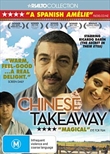An understated tale of redemption in face of the absurdity of life. Wry humour, pathos, and friendship across barriers are the motifs. Now that Roger Ebert is no longer there, I try to view movies as he would. He would like this I am sure.

Ricardo Darín is, as always, impeccable as the wary and weary Ricardo. He is subdued, defeated, grumpy, sullen, grey, grizzled, ragged, prissy…. He counts the nails in a box, in every box, delivered to his hardware store. The count is short, as frequently it is. On the telephone he complains in a tirade that seems an often repeated performance well out of proportion to the offense. When the supplier tries to make amends with some free extras in the next delivery, these he refuses and sets about counting the nails in this delivery. Take that! What is at stake is not the nails but the principle! But what principle?
When not counting nails, at the end of the day Roberto compiles newspaper cuttings into albums that demonstrate the absurdity of life. He subscribes to a lot of newspapers to find these stories. Some of the stories are hilarious, as long as it is not you. In each case Roberto pictures himself in the victim’s role. Get it? In time even the absurd opening scene is explained. (During the credits this explanation is vindicated, so keep watching.)
Maria throws herself at him but he cannot let anyone touch his emotions because, as the evidence in the albums shows, it will turn out badly, everything turns out badly, even having a shave in a barber’s chair. Then the Chinese, Jun, pops up and somehow gets inside the shell, and stays. In time Roberto learns he is not alone in his misery. In time he learns that life goes on and there is no escaping from it. He learns this from Jun’s persistence in the face of even greater adversity.
If you have no emotions then no one can hurt you, this seems to be Roberto’s approach to life. But Jun has even less than he has, so Roberto helps him, reluctantly, then for a moment the tables are turned and Jun comes to his rescue. Now Roberto has to stay the course. And there is Chinese take-away.
Some of the comic scenes are overdone like the one at the Chinese Consulate but who cares. The film oscillates from realism to parody but it does not go to either extreme.
With any and everything from Argentina I look for the Dirty War. This one refers to the Falklands War. And once again here the police are malevolent, a staple of Argentine films, and perhaps a reminder of the Dirty War. Also the newspaper that has the picture that starts the album is Italian, not Argentine because, I assume, of censorship in Argentina.
Civic Video in Newtown has one copy.
Skip to content
